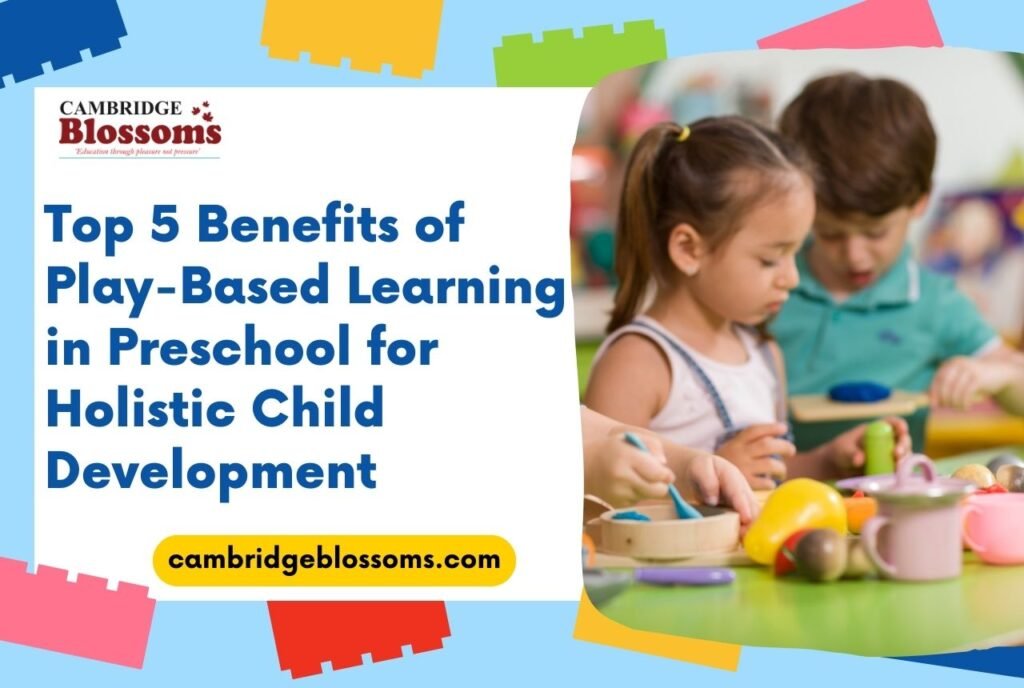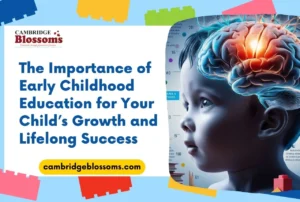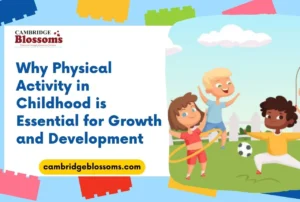In the ever-evolving landscape of early childhood education, the benefits of play-based learning in preschool have gained significant recognition for their holistic approach to nurturing young minds. Unlike traditional rote methods, play-based learning emphasizes exploration, imagination, and joyful discovery, helping children absorb knowledge in a natural, engaging way.
With the introduction of the New Education Policy (NEP) 2020 in India, the importance of play-based learning has been highlighted more than ever, urging preschools to adopt this dynamic and child-centric methodology. Recognizing that learning through play lays the foundation for lifelong growth, educators and parents alike are shifting their perspectives toward more experiential approaches.
In this blog, we will explore the five major benefits of play based learning in preschool, showcasing how it supports every aspect of a child’s development.
Understanding the Benefits of Play-Based Learning in Preschool
Play-based learning is an educational approach where structured and unstructured play experiences form the core of teaching and learning. Unlike traditional classroom methods that often rely heavily on direct instruction and passive memorization, play-based learning engages children actively, allowing them to discover, explore, and understand concepts at their own pace.
Purposeful play involves activities that are carefully designed to meet developmental goals while keeping children’s interests at heart. In a preschool setting, this can include storytelling sessions, building with blocks, role-play, and even outdoor adventures. Teachers act as facilitators, subtly guiding children’s learning journeys without controlling their activities.
There are two main types of play-based learning: child-directed, where children choose how and what they want to play, and teacher-directed, where educators plan activities that still allow flexibility and creativity.
As of 2025, growing research continues to support the benefits of play-based learning in preschool, indicating its positive impact on academic readiness, emotional resilience, and social competence. Studies show that children exposed to play-based learning exhibit higher levels of motivation, better problem-solving skills, and stronger relationships compared to those in more rigid educational settings.
1. Enhances Cognitive Development and Problem-Solving Skills
Play is instrumental in fostering critical thinking and decision-making abilities in preschoolers. When children engage in puzzles, building activities, or imaginative games, they are naturally driven to plan, predict outcomes, and solve problems. These activities highlight the benefits of play-based learning in preschool, promoting cognitive growth and problem-solving skills.
Pretend play, in particular, develops executive function skills, such as working memory, cognitive flexibility, and self-control. Memory development is also enhanced as children recall roles, rules, and sequences involved in play scenarios, further reinforcing the benefits of play-based learning in preschool.
Examples like assembling building blocks, sorting games, and strategic board games actively stimulate brain development. These cognitive skills not only prepare children for formal academics but also build a strong foundation for lifelong learning and adaptability.
2. Fosters Social Skills and Emotional Intelligence
One of the key benefits of play-based learning in preschool is the nurturing of essential social and emotional skills. Shared play experiences teach children to communicate effectively, collaborate, and work as a team.
Through role-playing games and group activities, children learn conflict resolution, negotiation, and empathy — understanding and respecting different perspectives. Play also provides a safe space for children to express, manage, and understand their emotions, contributing to healthier self-esteem and resilience.
These interpersonal skills are crucial not only for school readiness but also for success in relationships and professional life in the future.
3. Promotes Language Development and Communication
Play-based learning offers countless opportunities for organic language development. As children engage in storytelling, role-play, and interactive games, they naturally expand their vocabulary and conversational skills.
Teachers play an important role by introducing new words, encouraging dialogue, and modeling effective communication. This interaction strengthens both verbal and non-verbal communication abilities.
Activities like puppet shows, pretend grocery shopping, and cooperative storytelling greatly enhance literacy skills. Thus, one of the greatest benefits of play-based learning in preschool is its ability to lay a strong foundation for reading, writing, and expressive abilities early on.
4. Develops Physical Skills and Sensory Processing
Physical activity is a crucial component of holistic development. Through drawing, painting, cutting shapes, and other fine motor tasks, children develop precision and hand-eye coordination. Meanwhile, running, jumping, climbing, and balancing activities build gross motor skills essential for strength, agility, and endurance.
Sensory play, involving textures, sounds, and tactile experiences, sharpens brain processing and integration. Physical play not only boosts overall health but also prepares children for classroom demands, such as sitting for periods and writing tasks.
This intertwining of movement and learning highlights another key benefit of play-based learning in preschool, contributing to children’s academic and social readiness.
5. Cultivates Creativity, Imagination, and a Love for Learning
At its core, play-based learning ignites creativity and imagination, allowing children to explore different worlds and express their unique perspectives. Whether building imaginary cities or inventing new games, children develop creative thinking, which is a valuable 21st-century skill.
By fostering self-expression and intrinsic motivation, play-based learning instills a genuine love for learning. Children become active participants in their education rather than passive receivers, setting the stage for lifelong curiosity and innovation.
Creativity not only enriches personal growth but also enhances problem-solving and adaptability, vital traits for success in today’s fast-evolving world.
Cambridge Blossoms: Leading Play-Based Learning in Guwahati
Cambridge Blossoms, one of Guwahati’s premier preschools, exemplifies excellence in play-based learning. Rooted in a curriculum that balances academic preparation with joyful exploration, Cambridge Blossoms seamlessly blends international best practices with local cultural relevance.
As a sister institution to the prestigious International School Guwahati (Cambridge), Cambridge Blossoms ensures that children receive world-class early education with a nurturing touch. Their recent grand celebration, the 15th Synchrony event held in January 2025, is a testament to their commitment to fostering talent and creativity from a young age.
Through carefully curated play experiences, Cambridge Blossoms not only prepares children for future academic success but also molds well-rounded, emotionally intelligent individuals ready to thrive in a global society.
Implementing Play-Based Learning at Home
Parents can support the benefits of play based learning in preschool at home by creating a play-friendly environment. Simple activities like storytelling, pretend play with household items, outdoor games, and arts and crafts nurture creativity and curiosity.
Most importantly, parents should actively participate and encourage exploration without dictating play, making learning a shared, joyful journey.
Why Play-Based Learning Matters Most in Preschool Education
The five amazing benefits of play based learning in preschool — cognitive growth, social development, language enhancement, physical strengthening, and creativity fostering — clearly illustrate why this approach is essential for early childhood education.
For parents in Guwahati seeking the best for their children, visiting Cambridge Blossoms offers a wonderful opportunity to experience the magic of play-based learning firsthand.




